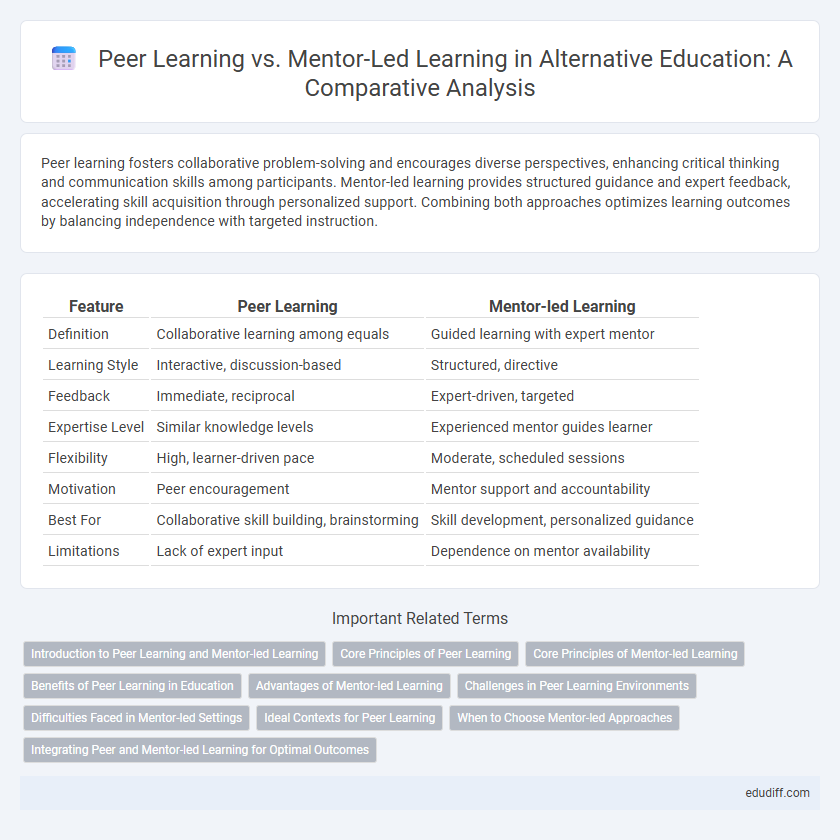Peer learning fosters collaborative problem-solving and encourages diverse perspectives, enhancing critical thinking and communication skills among participants. Mentor-led learning provides structured guidance and expert feedback, accelerating skill acquisition through personalized support. Combining both approaches optimizes learning outcomes by balancing independence with targeted instruction.
Table of Comparison
| Feature | Peer Learning | Mentor-led Learning |
|---|---|---|
| Definition | Collaborative learning among equals | Guided learning with expert mentor |
| Learning Style | Interactive, discussion-based | Structured, directive |
| Feedback | Immediate, reciprocal | Expert-driven, targeted |
| Expertise Level | Similar knowledge levels | Experienced mentor guides learner |
| Flexibility | High, learner-driven pace | Moderate, scheduled sessions |
| Motivation | Peer encouragement | Mentor support and accountability |
| Best For | Collaborative skill building, brainstorming | Skill development, personalized guidance |
| Limitations | Lack of expert input | Dependence on mentor availability |
Introduction to Peer Learning and Mentor-led Learning
Peer learning fosters collaborative knowledge exchange where learners actively engage and support each other's growth, enhancing critical thinking and communication skills. Mentor-led learning involves direct guidance from experienced professionals, providing personalized feedback and structured development pathways. Both approaches offer distinct advantages for skill acquisition and learner empowerment in diverse educational environments.
Core Principles of Peer Learning
Peer learning is grounded in collaboration, mutual engagement, and shared responsibility, allowing learners to construct knowledge through social interaction and diverse perspectives. This approach emphasizes active participation, critical thinking, and feedback exchange, fostering autonomy and deeper understanding. Unlike mentor-led learning, peer learning cultivates a supportive community where learners co-create meaning and enhance collective problem-solving skills.
Core Principles of Mentor-led Learning
Mentor-led learning centers on personalized guidance, where experienced mentors tailor knowledge transfer to the mentee's specific needs and goals, fostering deep expertise development. This approach emphasizes accountability, structured feedback, and continuous skill refinement, ensuring mentees receive targeted support and motivation. Unlike peer learning, mentor-led learning relies on hierarchical knowledge flow, promoting disciplined growth through expert-driven instruction and goal-oriented mentorship.
Benefits of Peer Learning in Education
Peer learning fosters active engagement and collaboration, enhancing critical thinking and problem-solving skills through shared knowledge and diverse perspectives. It promotes autonomy and confidence as students take responsibility for their own and others' learning, leading to deeper understanding and retention. Furthermore, peer learning cultivates communication and interpersonal skills, essential for real-world teamwork and lifelong learning.
Advantages of Mentor-led Learning
Mentor-led learning provides personalized guidance tailored to an individual's specific needs, accelerating skill acquisition and professional growth. Experienced mentors offer real-time feedback and share industry insights that foster deeper understanding and practical application. Structured mentorship also enhances accountability and motivation, leading to more consistent progress compared to peer learning environments.
Challenges in Peer Learning Environments
Peer learning environments often face challenges such as uneven participation, where confident students dominate discussions, while quieter learners remain passive. The lack of structured guidance can lead to misinformation or reinforcement of incorrect concepts without timely correction. Group dynamics issues, including conflicts or imbalanced skill levels, frequently hinder effective collaboration and learning outcomes.
Difficulties Faced in Mentor-led Settings
Mentor-led learning often presents challenges such as limited personalized attention due to fixed schedules and a single perspective that may not address diverse learner needs. Learners can experience dependency on the mentor's expertise, potentially reducing autonomy and critical thinking development. Communication barriers and hierarchical dynamics can also hinder open dialogue and peer collaboration, impacting overall learning effectiveness.
Ideal Contexts for Peer Learning
Ideal contexts for peer learning include collaborative environments like project-based classrooms, study groups, and professional development workshops, where reciprocal knowledge exchange enhances understanding. Peer learning thrives in settings that encourage active participation and social interaction, promoting critical thinking and problem-solving skills among learners. This approach is particularly effective for diverse learner groups, fostering autonomy and motivation through shared experiences.
When to Choose Mentor-led Approaches
Mentor-led learning is ideal when personalized guidance is crucial for mastering complex skills or navigating professional growth in specialized fields. This approach offers tailored feedback and accountability, enhancing development for mentees who require structured support and expert insights. Choosing mentor-led learning maximizes outcomes in scenarios demanding customized instruction and long-term relationship building.
Integrating Peer and Mentor-led Learning for Optimal Outcomes
Integrating peer learning with mentor-led learning enhances critical thinking and knowledge retention by combining collaborative problem-solving with expert guidance. Structured peer interactions supplemented by mentor feedback foster a dynamic learning environment that addresses diverse learning styles and accelerates skill acquisition. Effective integration leverages the strengths of both methods to create personalized, engaging educational experiences that drive optimal learner outcomes.
Peer Learning vs Mentor-led Learning Infographic

 edudiff.com
edudiff.com